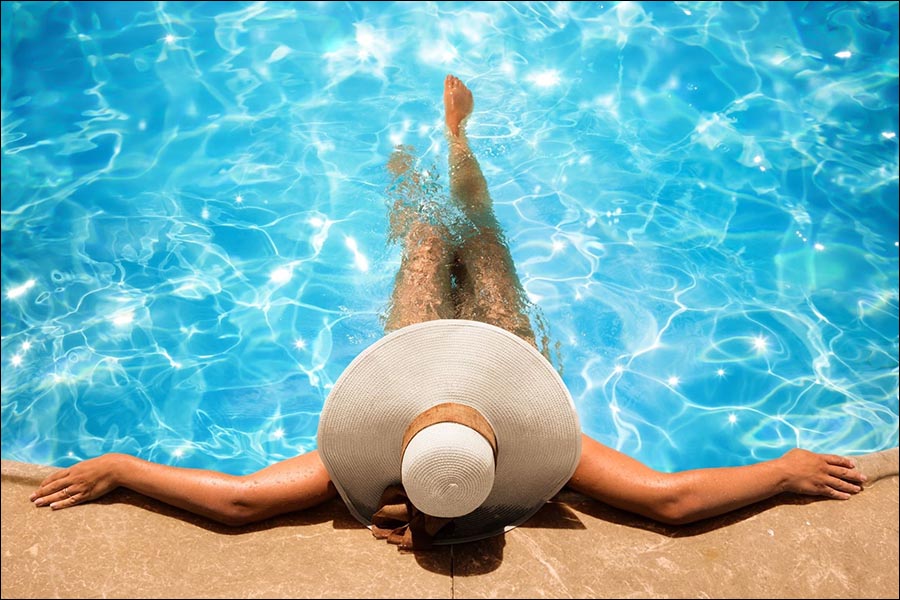Helpful Pool & Spa Advice

The Pros and Cons of Saltwater vs. Chlorine Pools
Choosing between a saltwater pool and a traditional chlorine pool is an important decision for pool owners. Both types of pools have their advantages and disadvantages, affecting everything from maintenance to long-term costs and swimmer comfort. In this article, we’ll compare the pros and cons of saltwater and chlorine pools to help you decide which system is the best fit for your backyard oasis.
1. Introduction to Saltwater and Chlorine Pools
Saltwater pools use a salt chlorine generator to convert salt into chlorine, which sanitizes the pool water. In contrast, traditional chlorine pools require adding liquid chlorine or chlorine tablets directly into the water. While both types of pools rely on chlorine to kill bacteria and algae, the method of delivery and maintenance differ greatly. Understanding these differences can help you choose the right system for your spa, hot tub, or pool.
2. Pros of Saltwater Pools
One of the biggest benefits of saltwater pools is the softer, gentler water they provide. Swimmers often find that saltwater pools are less harsh on their skin, hair, and eyes compared to chlorine pools. Since saltwater systems produce chlorine gradually, there’s a more consistent level of chlorine in the pool, which reduces the strong smell often associated with traditional chlorine pools. Additionally, saltwater pools require less frequent chemical adjustments and are easier to maintain over time.
- Softer, less irritating water for swimmers.
- Consistent chlorine levels reduce chemical odor.
- Lower maintenance and fewer chemical additions.
3. Cons of Saltwater Pools
Despite their advantages, saltwater pools have some downsides, particularly when it comes to upfront costs. Salt chlorine generators are more expensive to install than traditional chlorine systems, and they can also be more complex to repair or replace. Additionally, the salt used in the pool can be corrosive to certain materials, such as pool equipment, fixtures, and surrounding surfaces, requiring pool owners to choose more durable and often pricier materials.
- Higher initial cost for the salt chlorine generator.
- Potential for salt to corrode pool equipment and surrounding materials.
- More complex repairs and system maintenance.
4. Pros of Chlorine Pools
Chlorine pools have been the standard for decades and offer some clear advantages. They are typically cheaper to install since there’s no need for a salt generator. Chlorine pools are also highly effective at killing bacteria and preventing algae growth when properly maintained. For those who prefer the traditional pool maintenance routine and don’t mind handling chemicals, chlorine pools provide a tried-and-true method of keeping the water clean and sanitary.
- Lower upfront installation costs.
- Highly effective in sanitizing the pool and preventing algae growth.
- Traditional system familiar to most pool owners.
5. Cons of Chlorine Pools
One of the main drawbacks of chlorine pools is that they require frequent chemical adjustments. Chlorine needs to be added regularly, and pool owners must consistently monitor pH levels and chlorine concentrations. The smell of chlorine can be overwhelming at times, especially if levels are too high, and many swimmers experience skin and eye irritation from extended exposure to chlorinated water. Over time, the cost of chemicals for maintenance can also add up, making chlorine pools more expensive in the long run.
- Regular addition of chlorine and chemical adjustments required.
- Strong chlorine odor and potential for skin and eye irritation.
- Long-term chemical costs may accumulate.
6. Maintenance Comparison
When comparing the maintenance requirements of saltwater vs. chlorine pools, it’s clear that saltwater systems are generally easier to manage once installed. Salt chlorine generators automatically produce chlorine, meaning you don’t have to manually add chemicals as often. However, saltwater systems still require periodic maintenance, such as checking salt levels and cleaning the generator’s cell. On the other hand, chlorine pools demand regular chemical testing and adjustments to keep the water balanced and safe for swimmers.
- Saltwater pools: Automatic chlorine generation reduces the need for manual chemical addition.
- Chlorine pools: Require regular chemical testing and adjustment for optimal balance.
- Both systems need routine checks for optimal performance.
7. Final Considerations: Which Pool Is Right for You?
The choice between a saltwater and a chlorine pool depends largely on your priorities as a pool owner. If you’re looking for a low-maintenance option with softer water and don’t mind the higher upfront costs, a saltwater pool may be the right fit for you. However, if you prefer a more traditional system with lower installation costs and are comfortable with regular chemical maintenance, a chlorine pool might be a better choice. Ultimately, both types of pools can provide a clean, enjoyable swimming experience with the right care.
Key Points:
- Saltwater pools offer softer water and lower maintenance but come with higher upfront costs and potential for corrosion.
- Chlorine pools are cheaper to install and highly effective but require more frequent chemical adjustments and can cause skin irritation.
- Both systems have unique maintenance needs, with saltwater being more automated and chlorine requiring manual chemical management.

